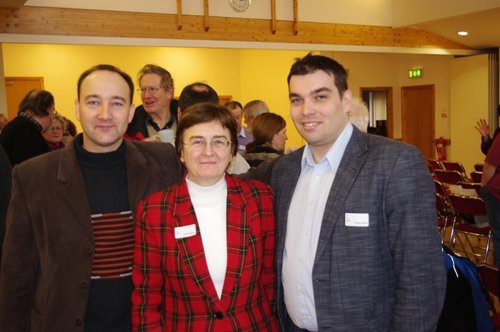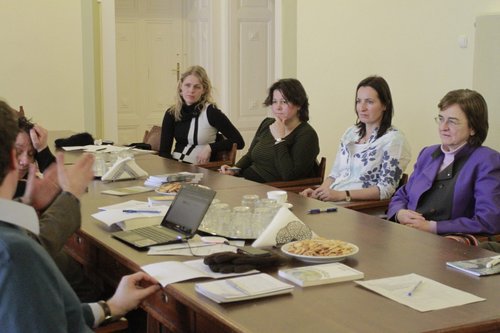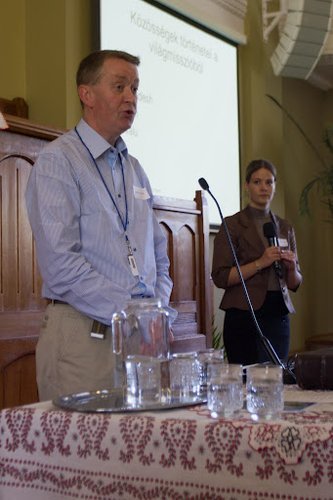In October, 2010 the Church of Scotland and the Reformed Church in Hungary joined an agreement in order to launch the Hungarian equivalent of the Eco-Congregation Programme, which is already running successfully in Scotland.
In the framework of the European Christian Environmental Network (ECEN), within the Eco-Management group, various two-sided partnerships have been established where the stronger party helps the other, less experienced church organisation in creating its own eco-programme. Some of the countries involved with the movement are Sweden, Germany, Poland, the Czech Republic, Romania and the United Kingdom. The head of the programme is Dr. Hans Diefenbacher, professor of economics at the University of Heidelberg.

Eco-Congregation in Scotland is an ecumenical movement with the mission to raise awareness for the protection of our environment in congregations all over the United Kingdom. The programme Eco-Congregation Scotland encourages practical action as a response to the problems our planet is presently facing. The programme promotes self-supporting activities as a means to live a green-conscious Christian life.
Following the pattern established by the Scottish Church, the Reformed Church in Hungary aims to create a volunteer-based scheme as a direct way to offer opportunities to those individuals and church groups who feel the urge to protect God's creation. In this field, various local initiatives have been born. The Scottish Church's many years of experience will be of benefit for the Hungarian Reformed church and its congregations to establish their own nationwide network, which will also encourage the birth of new ideas and projects. Hungarian organisers intend to build a bridge between several interested groups and individuals, who wish to get involved in the initiative.
In order to study the Scottish example and to gain insight into an already well-functioning system, from March 4 to 6, 2011 a Hungarian delegation of Reformed ministers visited Scotland. The group consisted of Eszter Karsay, Tamás Kodácsy and László Pál Szalay. The discussions were centred around possible ways to motivate church groups to join the community of eco-congregations. Another objective was to draft a specific system of management and criteria which will secure the long-term existence of the green initiative in Hungary. Up to now, some isolated programmes and projects have been accomplished within the Hungarian church, but the increasing need of environmental provision has now made it necessary to launch a wider range of environmental activities.
The delegates studied the Scottish eco-prize system based on which the Hungarian equivalent will be created. The Hungarian eco-prize, just like the Scottish one, will serve as a way to encourage congregations in their activities of environment protection. The Scottish eco-prize is given to those congregations which, according to the central system of criteria, are achieving great results in their own field of activities. Moreover, the church groups have to study 13 modules which tackle some basic themes, including
"Growing in faith and understanding",
"Make the House of God an environment-friendly place" and
"Changing life, changing community".

The Hungarian delegates attended the annual Eco-Congregation Conference in Bridge of Allan, where over 100 people represented 30 congregations. The central topic was "Daily Bread", which was also the subject of the opening devotional presented by Kathy Galloway, leader of the Christian Aid Scotland. At the conference, beside the Hungarian eco-congregation initiative, such topics were discussed as climate change, biodiversity, fair trade, Scottish wood processing and the Christian Aid movement.
Following the conference in Scotland Rev. David Arnott, the moderator of the General Assembly of the Church of Scotland, paid an official visit to Hungary and met the members of the Eco-Congregation Council. The eco-congregation initiative is going to be a highlighted area of cooperation between the Scottish Church and the Reformed Church in Hungary, further strengthening their affiliation. The political role of the Hungarian Eco-Congregation Council in Hungary will be to prepare and mediate the resolutions of the Reformed Church concerning ecological issues to the state and society. It is also the Council's task to seek and establish any forms of cooperation with other churches and eco-groups in Hungary.
At the meeting, the Hungarian Eco-Congregation movement's website was introduced. The website has been designed with the goal to gather all secular and church documents in relation to environment and creation protection, to share any news and useful information, and to offer e-learning material as a means to help congregations establish environment-conscious lifestyle. This eco-movement is going to be the first of its kind in Hungary, serving to promote green values in congregations. It will also seek to provide all theological background and practical instructions necessary for the realisation of these ideas.
The Eco Congregation Council was established on January 4th 2012 within the framework of ECEN, with the aim to raise awareness in Reformed congregations for environment protection. The Council will also undertake to mediate the Reformed Church's resolutions regarding ecological issues to the government and society.
The members of the Eco Congregation Council are Dr Barbara Botos environment protection expert, Géza Gyimóthy environmental engineer, Ágnes Fekete minister, Eszter Karsay minister, Tamás Kodácsy minister, Konkolyné Zita Bihari climatologist, Mária Szabó economist, László Pál Szalay minister, Boglárka Szűcs biology and geography teacher, Dr László Végh physicist and Dr András Viktor teacher of environmental studies.
The Council wishes to involve the dimension of faith in ecological thinking, to make people aware of the fact that God is not indifferent towards the suffering of His creation.

The Hungarian Eco-Congregation Council's first conference, which took place in April, was intertwined by the motto that Christians are highly responsible for the condition of our planet. As Eszter Kodácsy-Simon Lutheran theologian shared in her devotional, the fate of Creation is closely linked to that of humankind. Our involvement in environmental issues and our responsibility are clearly manifested in the Scripture; the idea of green theology is not altogether new, taking care of God's world has always been a major task of God's people. Green theology is only new in the sense that it discusses and raises awareness to the most up-to-date environmental issues of our time.
At the conference, Zita Bihari climatologist, Head of the Climate Department at the Hungarian Meteorological Service, elder at the Svábhegy Reformed Congregation held a presentation in the topic of climate change, informing conference members about the necessity to take immediate action.
"The climate change indicates that we are bad stewards of God's creation", warned Adrian Shaw, climate change officer of the Church of Scotland, as he introduced the eco-congregation programme in Scotland. He discussed the political activities the Church of Scotland is currently involved with in order to slow down global warming. Alison Boyes, member of Ecocongregation Scotland Board, citizen and active member of the Dunscore Church which had won the eco-congregation prize for the third time, presented some practical ideas of eco-management. The Hungarian Eco-Prize was also announced at the conference as an inspiring challenge for the Hungarian participants of the programme.

According to Reformed minister László Pál Szalay, member of the Eco-Congregation Council, a more creative way of living our life will provide the human race with a greater chance to survive climate change. Besides being biblical, eco-theology and the eco-congregation initiative make congregations more colourful and lasting, and what is more, they strengthen the faith of church members.
The Scottish-Hungarian project is managed by two core groups, one in Scotland and one in Hungary. The Hungarian core group is responsible for the events and project procedures taking place in Hungary, and they also take care of the translation work of all written materials related to the programme.
Within the Hungarian framework, three recent projects have been launched: Creation Time, Egyháztáji (Church Farmer's Market) and TIÉD (Traditional and Innovational Values in Dialogue). Creation Time has been established by ECEN; it is going to be an annual programme, remembering God's created world. This special time period will officially be marked in next year's Reformed church calendar and Bible Reading Guide. In Hungary, the last week of September (Week of Creation) is going to be dedicated to the celebration of God's creation work.
The programme "Egyháztáji" has been designed to serve as a direct link between the rural farmers and urban consumers of the church. It is a nonprofit trade programme with the aim to promote both farmers' and consumers' responsibility for the created world.
TIÉD was started by ECEN in Hungary in the year 2011, with the financial support of the European Union. TIÉD is an acronym (Traditional and Innovational Values in Dialogue), but in Hungarian it also means "yours", as the protection of our planet and the responsibility for creation is something every human being has to take personally. TIÉD takes place in the form of a roadshow with the aim to promote environmental thinking in 10 different Hungarian towns.
The main objectives of the Hungarian eco-programme remain to exchange information on eco-management facilities and activities of churches in Scotland and Hungary, to import and adapt ideas from the "Eco-Congregation Scotland" project and to form a new Advisory Council in Hungary to assist congregations in making the link between environmental issues and Christian faith both in spiritual and practical life. Since the conclusion of the latest Eco-Congregation meeting in Hungary, council members have advertised the eco-initiative in various church programmes, including the "Szélrózsa" Lutheran Youth Festival and the Reformed Church Days of the Transdanubian Reformed Church District (REND).
Katalin Burns